

10 Ways You Can Increase Dopamine Levels In The Brain Without Medication. How to Overcome Laziness: This 1-Minute Trick Can Change Your Life. How many times you have made a decision to change or simply start a new way of life?

Do you remember your last New Year’s resolution and what it was all about? It probably sounded something like this: “From now on I’ll start eating healthy food, I’ll be working out 3 times a week, I’ll take yoga classes, I’ll start meditating and I am going to read a book a day!” It’s OK, every single person had been enthusiastic about something similar and failed to accomplish it at least once in their life. It’s very common and recommended that you set certain goals in life as it is normal to fail at some of them. The Science of Why We Sleep and What Happens Inside Our Brains When We Do. By Maria Popova “Something nameless hums us into sleep,” the poet Mark Strand wrote in his beautiful ode to dreams.
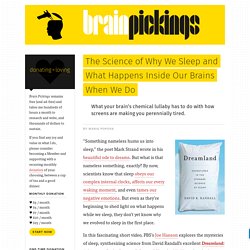
But what is that nameless something, exactly? By now, scientists know that sleep obeys our complex internal clocks, affects our every waking moment, and even tames our negative emotions. Procrastination Is a Strong Emotional Coping Mechanism. By Orion Jones Procrastination is more than simply spending time on Facebook before starting your work duties.
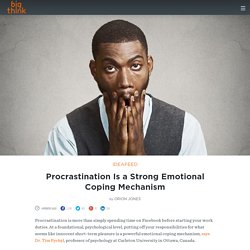
At a foundational, psychological level, putting off your responsibilities for what seems like innocent short-term pleasure is a powerful emotional coping mechanism, says Dr. Tim Pychyl, professor of psychology at Carleton University in Ottawa, Canada. New Research Says Overthinking Worriers Are Probably Creative Geniuses. Related: New Research Says Worry And Anxiety Are Linked To High IQ Researchers at King's College in London made the connection between anxiety and a stronger imagination as well.
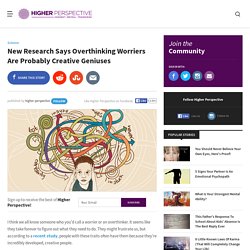
According to Dr. Adam Perkins, an expert in Neurobiology of Personality: “It occurred to me that if you happen to have a preponderance of negatively hued self-generated thoughts, due to high levels of spontaneous activity in the parts of the medial prefrontal cortex that govern conscious perception of threat and you also have a tendency to switch to panic sooner than average people, due to possessing especially high reactivity in the basolateral nuclei of the amygdale, then that means you can experience intense negative emotions even when there's no threat present. This could mean that for specific neural reasons, high scorers on neuroticism have a highly active imagination, which acts as a built-in threat generator.
" Full Spectrum Bliss: The Secret to an Oxytocin-Based Sexual Connection. By Indra Contributing Writer for Wake Up World.

Stress and the Social Self: How Relationships Affect Our Immune System. Relationships, Adrienne Rich argued in her magnificent meditation on love, refine our truths.
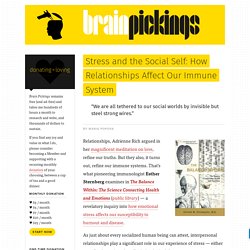
But they also, it turns out, refine our immune systems. That’s what pioneering immunologist Esther Sternberg examines in The Balance Within: The Science Connecting Health and Emotions (public library) — a revelatory inquiry into how emotional stress affects our susceptibility to burnout and disease. As just about every socialized human being can attest, interpersonal relationships play a significant role in our experience of stress — either contributing to it and or alleviating it.
The benefits of a bilingual brain - Mia Nacamulli. Amazed by what you have learned about having a bilingual brain?
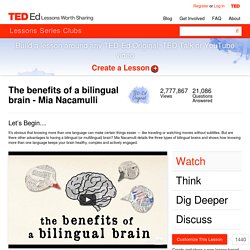
Then, start learning another language now! This website has tons of free lessons, games and quizzes to get you started! Pick one language or even two languages and get that gray matter growing. Speaking more than one language is like exercise for the brain? The Science of Love: How Positivity Resonance Shapes the Way We Connect. By Maria Popova The neurobiology of how the warmest emotion blurs the boundaries by you and not-you.
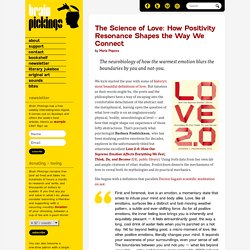
We kick-started the year with some of history’s most beautiful definitions of love. But timeless as their words might be, the poets and the philosophers have a way of escaping into the comfortable detachment of the abstract and the metaphysical, leaving open the question of what love really is on an unglamorously physical, bodily, neurobiological level — and how that might shape our experience of those lofty abstractions. That’s precisely what psychologist Barbara Fredrickson, who has been studying positive emotions for decades, explores in the unfortunately titled but otherwise excellent Love 2.0: How Our Supreme Emotion Affects Everything We Feel, Think, Do, and Become (UK; public library).
The Science of Sleep: Dreaming, Depression, and How REM Sleep Regulates Negative Emotions. By Maria Popova “Memory is never a precise duplicate of the original… it is a continuing act of creation.
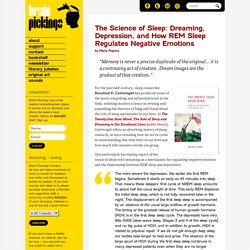
Dream images are the product of that creation.” For the past half-century, sleep researcher Rosalind D. The Meaning of True Love (from a Buddhist's Perspective). Did you ever fall in love with someone?

I did. Love and longing can drive anyone to perpetually clinging to an object of desire, with no end in sight—a need that can never quite be satisfied, a thirst that can never be quenched. Can the love of falling in love outweigh the fear of “falling”…? I guess the moment you fall in love with someone, you’re in the moment, and it’s only afterwards that you’re able to make the analysis, and even realize you were in love. Falling implies surrendering—being out of the mind, or out of your mind! Where do you find yourself? Science Graphic of the Week: How Magic Mushrooms Rearrange Your Brain. Communication between brain networks in people given psilocybin (right) or a non-psychedelic compound (left).
Petri et al. /Proceedings of the Royal Society Interface A new way of looking at brain activity may give insight into how psychedelic drugs produce their consciousness-altering effects. In recent years, a focus on brain structures and regions has given way to an emphasis on neurological networks: how cells and regions interact, with consciousness shaped not by any given set of brain regions, but by their interplay. Understanding the networks, however, is no easy task, and researchers are developing ever more sophisticated ways of characterizing them. Perhaps some aspects of consciousness arise from these meta-networks—and to investigate the proposition, the researchers analyzed fMRI scans of 15 people after being injected with psilocybin, the active ingredient in magic mushrooms, and compared them to scans of their brain activity after receiving a placebo.
How do pain relievers work? - George Zaidan. A bowling ball and feather fall in world's biggest vacuum chamber. You probably already know how this one ends, but that doesn't make watching it play out any less spectacular. [optional caption text here] Image: [name here]/Shutterstock The combination of bowling ball and feather is the perfect way to demonstrate air resistance, also known as drag. Because the shape of the feather allows it to endure way more air resistance than the bowling ball, it takes much longer to fall to the ground. British physicist Brian Cox wanted to see this primary-school problem play out in a vacuum, where there is zero air resistance to mess with the results.
Fixed vs. Growth: The Two Basic Mindsets That Shape Our Lives. “If you imagine less, less will be what you undoubtedly deserve,” Debbie Millman counseled in one of the best commencement speeches ever given, urging: “Do what you love, and don’t stop until you get what you love. Work as hard as you can, imagine immensities…” Far from Pollyanna platitude, this advice actually reflects what modern psychology knows about how belief systems about our own abilities and potential fuel our behavior and predict our success. Much of that understanding stems from the work of Stanford psychologist Carol Dweck, synthesized in her remarkably insightful Mindset: The New Psychology of Success (public library) — an inquiry into the power of our beliefs, both conscious and unconscious, and how changing even the simplest of them can have profound impact on nearly every aspect of our lives.
Sam Harris on the Paradox of Meditation and How to Stretch Our Capacity for Everyday Self-Transcendence. Montaigne believed that meditation is the finest exercise of one’s mind and David Lynch uses it as an anchor of his creative integrity. Over the centuries, the ancient Eastern practice has had a variety of exports and permutations in the West, but at no point has it been more vital to our sanity and psychoemotional survival than amidst our current epidemic of hurrying and cult of productivity.
It is remarkable how much we, as a culture, invest in the fitness of the body and how little, by and large, in the fitness of the spirit and the psyche — which is essentially what meditation provides. In Waking Up: A Guide to Spirituality Without Religion (public library), neuroscientist and philosopher Sam Harris argued that cultivating the art of presence is our greatest gateway to true happiness.
The Magic and Logic of Color: How Josef Albers Revolutionized Visual Culture and the Art of Seeing. By Maria Popova “A thing is never seen as it really is.” “Hundreds of people can talk, for one who can think,” John Ruskin wrote, “but thousands of people can think, for one who can see.” “We see, but we do not see: we use our eyes, but our gaze is glancing, frivolously considering its object,” Alexandra Horowitz lamented in her sublime meditation on looking. Hardly anyone has accomplished more in revolutionizing the art of seeing than German-born American artist, poet, printmaker, and educator Josef Albers, as celebrated for his iconic abstract paintings as he was for his vibrant wit and spellbinding presence as a classroom performer.
How to Train Your Brain to Stay Focused. As an entrepreneur, you have a lot on your plate. Staying focused can be tough with a constant stream of employees, clients, emails, and phone calls demanding your attention. Amid the noise, understanding your brain’s limitations and working around them can improve your focus and increase your productivity. Our brains are finely attuned to distraction, so today's digital environment makes it especially hard to focus. The Relation Between the Moon and the Human Mind. Every thing around us has an effect on something within us – be it our exposure to the sun’s ultraviolet radiation (UVR), looking at the morning sky, taking a walk in the forest, or swimming in the sea – nature’s beauty prompts the flow of hormones and energy in our body. How sugar affects the brain - Nicole Avena.
Dr. (VIDEO) The Observable Universe: A moment of Awe The age of the universe is about 13.75 billion years. The diameter of the observable universe is estimated at about 28 billion parsecs (93 billion light-years). As a reminder, a light-year is a unit of length equal to just under 10 trillion kilometers (or about 6 trillion miles). Fixed vs. Growth: The Two Basic Mindsets That Shape Our Lives. Marijuana’s Long Term Effects On The Brain Finally Revealed! First LSD Study in 40 Years Finds Therapeutic Potential. The first LSD study in 40 years finds therapeutic potential. The Science of How Music Enchants the Brain, Animated. The Science of Lucid Dreaming and How to Learn to Control Your Dreams, Animated. The Backfire Effect: The Psychology of Why We Have a Hard Time Changing Our Minds.
By Maria Popova. The Science of How Memory Works. How Many of These 51 Spiritual Awakening Symptoms do YOU Have? 1. Changing sleep patterns: restlessness, hot feet, waking up two or three times a night. Looking At Tears Under A Microscope Reveals A Shocking Fact. Share on Facebook One day Rose-Lynn Fisher wondered if her tears of grief would look different compared to her tears of joy, so she began to explore them up close under a microscope. She studied 100 different tears and found that basal tears (the ones that our body produces to lubricate our eyes) are drastically different from the tears that happen when we are chopping onions. The tears that come about from hard laughter aren’t even close to the tears of sorrow. The Evolutionary Mystery of Left-Handedness and What It Reveals About How the Brain Works. What the Science of “Sleep Paralysis” Reveals About How the Brain Works.
Neurocomic: A Graphic Novel About How the Brain Works. BioPhotons ~ Secrets of the Human Energy Field Revealed! How the Universe Works: Stephen Hawking’s Theory of Everything, Animated in 150 Seconds. Beau Lotto: Optical illusions show how we see. Synesthesia Spotlight: 3 Visualizations of Music. Brainman: Inside the Mind of an Autistic Savant. Where You Are: Cartography as Wayfinding for the Soul. Banned TED Talk: Graham Hancock – The War on Consciousness. This Explains Everything: 192 Thinkers on the Most Elegant Theory of How the World Works. The Way These Acrobats Think About Trust Is Pretty Different Than the Way We Do. Consciousness: Eight questions science must answer. Do Brain Workouts Work? Science Isn't Sure. How To Stop Overthinking – 9 Simple Habits. Marijuana for Cancer Prevention. MDMA, Ηρωίνη, LSD, και άλλα ναρκωτικά στο μικροσκόπιο.
The Dangers Of Taking Aspirin or Ibuprofen. Brand Logos With Subliminal Messages. Male and female brains wired differently, scans reveal. Τι ακούει στο μυαλό του κάποιος με διάγνωση σχιζοφρένειας; Should you trust your first impression? - Peter Mende-Siedlecki. ART STORIES: Ο πίνακας Los esfuerzos esteriles του Νταλί. How do pain relievers work? - George Zaidan. Ένα πορτρέτο ζωγραφισμένο εννέα διαφορετικές φορές, υπό την επήρεια LSD. 5 examples of how the languages we speak can affect the way we think. To προφίλ της τσίχλας. Geometrical Psychology: Benjamin Betts’s 19th-Century Mathematical Illustrations of Consciousness.
Το Πείραμα Υπακοής Milgram Greek subs.